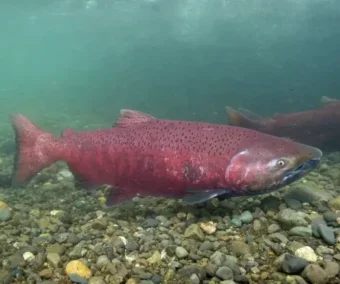
Conservation Lawsuit Aims to Protect Alaska King Salmon from Extinction
A significant environmental legal battle has emerged this week as the Wild Fish Conservancy, a Washington state-based conservation group, has filed a lawsuit in U.S. District Court aimed at speeding up the review process for listing the venerable Alaska king salmon under the Endangered Species Act. This crucial initiative underscores the plight of this iconic fish species, a vital part of both the ecosystem and Alaska's fishing industry.

The lawsuit is not merely a legal technicality; it's a desperate cry for action amid a growing crisis. The conservancy contends that the National Marine Fisheries Service (NMFS) has overlooked a 12-month deadline to decide on the proposal submitted on January 11, 2024. The suit calls for an expedited decision, reflecting the urgency of protecting a species susceptible to extinction.
Emma Helverson, the executive director of the Wild Fish Conservancy, emphasizes the dire circumstances surrounding the king salmon, stating, "With the crisis facing Alaskan chinook, we are out of time and options." This sentiment resonates deeply within the conservation community, where delays can have catastrophic consequences for vulnerable species.
Moreover, the conservancy's complaint paints a broader picture of systemic dysfunction within the NMFS, pointing to missed deadlines on previous listings. Such assertions raise important questions about the agency's operational efficacy, particularly when the survival of significant species hangs in the balance.
Jon Kurland, a top official with the Alaska fisheries service, acknowledged the review process's complexities, stating, "The agency is continuing to review the petition and to develop the required 12-month finding." While this may be perceived as a routine part of bureaucratic procedure, many argue that the stakes are simply too high for inaction.
Doug Vincent-Lang, Alaska's fish and game commissioner, expressed a different perspective, indicating that a thorough and measured approach might be preferable to a rushed decision driven solely by the statutory timeline. However, is a deliberate process more valuable when the delay could threaten the survival of a species?
The lawsuit follows a history of contentious measures taken by the conservancy in Alaska. Their advocacy has not only led to legal confrontations but also drawn ire from state officials and commercial fishermen worried about the economic ramifications of such protections. The potential listing of king salmon as endangered could impose sharp restrictions on harvesting methods, affecting various fisheries across the state.
In conclusion, the outcome of this lawsuit could shape the future of Alaska’s king salmon and the fishing communities that depend on it. As the risks of climate change, overfishing, and habitat destruction loom larger, we must ask ourselves: How far are we willing to go to protect our invaluable wildlife? Share your thoughts and join the discussion about this pressing conservation issue.